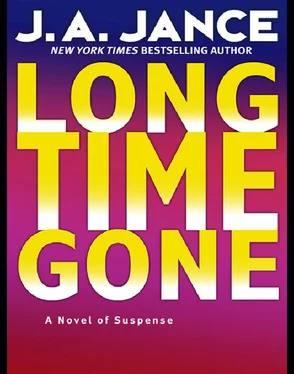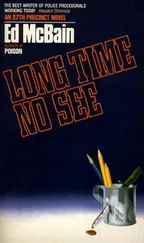J. Jance - Long Time Gone
Здесь есть возможность читать онлайн «J. Jance - Long Time Gone» весь текст электронной книги совершенно бесплатно (целиком полную версию без сокращений). В некоторых случаях можно слушать аудио, скачать через торрент в формате fb2 и присутствует краткое содержание. Жанр: Триллер, на английском языке. Описание произведения, (предисловие) а так же отзывы посетителей доступны на портале библиотеки ЛибКат.
- Название:Long Time Gone
- Автор:
- Жанр:
- Год:неизвестен
- ISBN:нет данных
- Рейтинг книги:5 / 5. Голосов: 1
-
Избранное:Добавить в избранное
- Отзывы:
-
Ваша оценка:
- 100
- 1
- 2
- 3
- 4
- 5
Long Time Gone: краткое содержание, описание и аннотация
Предлагаем к чтению аннотацию, описание, краткое содержание или предисловие (зависит от того, что написал сам автор книги «Long Time Gone»). Если вы не нашли необходимую информацию о книге — напишите в комментариях, мы постараемся отыскать её.
Long Time Gone — читать онлайн бесплатно полную книгу (весь текст) целиком
Ниже представлен текст книги, разбитый по страницам. Система сохранения места последней прочитанной страницы, позволяет с удобством читать онлайн бесплатно книгу «Long Time Gone», без необходимости каждый раз заново искать на чём Вы остановились. Поставьте закладку, и сможете в любой момент перейти на страницу, на которой закончили чтение.
Интервал:
Закладка:
As the call ended, I was coming up on the Northgate Exit on I-5. In all the hubbub of the last day or two, I realized, I had barely thought about my grandmother, much less called or stopped by since Lars told me she was in the hospital. Maybe, if I hurried, I could get to Swedish in Ballard before visiting hours ended. Abruptly crossing three lanes of traffic, I exited the freeway and headed straight there.
But I was too late. “Beverly Jenssen?” the receptionist said, typing in the name and then frowning at the answer that appeared on her computer screen. For a moment I held my breath.
“I’m afraid she’s not here,” the receptionist said. “She was released earlier this afternoon.”
Hearing the word “released” allowed my breathing to resume. I hurried back outside and stood in the haze of secondhand cigarette smoke that surrounds the entrances to most of Seattle’s public buildings. When I called Lars and Beverly’s apartment, he was the one who answered.
“Oh, ja,” Lars said. “The doctor sent her home today. Shouldn’t have, if you ask me. Beverly’s still weak as a kitten, but she wanted to be home with me. Doesn’t t’ink I can take care of myself.”
“I’m sorry,” I apologized. “I should have come by the hospital long before this.”
“You’re busy,” Lars said, excusing me. “Beverly and I don’t expect you to drop everyt’ing and come running every time one or the other of us ends up in the hospital. That’s why we have each other.”
“Can I speak to her now?” I asked.
“She’s already asleep, and I don’t want to wake her up. Coming back from the hospital pretty well wore her out,” Lars said. “Why don’t you give her a call in the morning. She’ll be glad to hear from you.”
I was on my way home from the hospital when my phone rang again. It was Ross Connors. “I’ve been in touch with Seattle PD,” he said. “If you’ll drop by the main lobby in the next little while and ask for Denise, she’ll have a care package waiting for you.”
It seems to me I spent most of my Seattle PD career at odds with one superior or another. Having Ross Connors go to the mat for me like this was an entirely new experience. Not sure what to expect, I drove straight to Seattle PD.
Denise was a uniformed officer womaning the Seattle PD reception desk. I gave her my name along with my ID. When she returned my ID, she also handed me a thick manila envelope. Standing off to one side of the nearly deserted lobby, I tore open the envelope and sorted through its contents. Inside I found copies of the official police reports on Elvira Marchbank and Wink Winkler. And at the very bottom of the envelope was a laminated special visitor’s pass that, for the next thirty days, allowed me unlimited access to come and go as I pleased in and around Seattle PD without the need of an escort.
In other words, Ross Connors was nothing short of a miracle worker.
Just to see if it would work, I left police headquarters and went downhill to the old Public Safety Building. The pass worked like a charm on both the outside entrance as well as for controlling the elevators. I went straight downstairs to the evidence room. There I filled out the proper form requesting access to the Madeline Marchbank evidence box. In Kramer’s eagerness to sign off on the other two cases, I guessed that he would have returned the box to where it belonged, and I was right.
Through some quirk in scheduling, the clerk behind the counter-the same one who had sicced Kramer on me two days earlier-found the box and handed it to me with no sign of recognition and without so much as a raised eyebrow.
“Is there someplace I can sit to look this over?” I asked.
She pointed wordlessly at the old wooden library carrel, and I didn’t bother to argue. The scarred surface at least offered a flat place for me to work.
When I opened the box, I discovered that, after three days of handling, the cardboard cover wasn’t nearly as dusty as it had been earlier. The first item I removed from inside-a bloodstained apron-sent a shiver of recognition down my spine. I wasn’t sure in which tape Sister Mary Katherine had mentioned the apron, but I remembered her saying in one of them that Mimi Marchbank had been wearing a flower-covered apron on the day she was murdered, but subsequent newspaper accounts of the crime had indicated that Mimi had been found stabbed to death in her bed. In my experience, not that many people wear aprons in bed. In addition to the apron I found a bagged and still-bloody knife, along with several more items of bloodstained clothing and bedding.
None of that surprised me. The contents all seemed perfectly normal. What wasn’t normal was what wasn’t there-the case log. With that missing, there was no official written account of Mimi Marchbank’s murder investigation-no record of where and when the physical evidence had been gathered and no list of who had been interviewed by detectives or why. Without that background information, the physical evidence itself was virtually useless.
So where did the case log go? I asked myself.
How long had it been missing? Had it been gone for decades-say, from the time Wink Winkler had left the department in disgrace-or was its disappearance as recent as this last Tuesday morning?
I replaced the items I had removed, and returned the box to the counter. “Did you find everything you needed?” the clerk asked.
“Absolutely,” I told her with what I hoped sounded like a hint of a swagger. “Everything I needed and more.” I walked out the door hoping that conversation, too, would be reported back to Captain Kramer.
I went home, dragged out my computer, and used my notes to type up the report I had promised to deliver to SHIT in the morning. Next I tackled the police reports I had collected on the deaths of Elvira Marchbank and Wink Winkler. It made for slow going.
Elvira had been found at the bottom of the stairs. A partial shoe print had been found on the glossy cover of a magazine that had landed close to the body. There had been no sign of forced entry; no sign of an altercation. Hair and fiber trace evidence had been collected for analysis, but that would take time. Detectives Jackson and Ramsdahl had conducted a series of interviews with people from the surrounding neighborhood, including one Raelene Landreth, executive director of the Marchbank Foundation. None of the interviewees had reported hearing or seeing anything amiss at Elvira’s residence.
With Wink Winkler there was obviously a crime scene somewhere, but so far no one had found it. Dead bodies sink. They don’t float back up to the surface until there’s a certain amount of decomposition. Wink’s body had been found snagged by a piling under a dock on Harbor Island. What that said to me was that the unknown crime scene was most likely relatively close to where the body was found and that the fact that he had come to the surface had more to do with currents and flood and ebb tide than with anything else.
Wink’s son, William Winkler III-Bill-had been interviewed twice, both times at corporate offices of Emerald City Security, the firm Wink had founded but which was now being run by his son. The first interview had occurred on Wednesday morning, when a uniformed officer had been dispatched to speak to him in regard to the missing person report called in by Wink’s assisted-living facility. The second interview had been conducted late that afternoon by Detectives Jackson and Ramsdahl. By then Wink’s body had been found and identified. Bill Winkler told them that his father had been unhappy about living in the “home” but that he hadn’t seemed either despondent or suicidal.
My spirit was willing, but the flesh is weak. Halfway through Detective Jackson’s interview with Wink’s son, I fell sound asleep. I woke up sometime later to find the loose pages of the reports scattered around the legs of my recliner. I took that as a sign that it was time to toddle off to bed.
Читать дальшеИнтервал:
Закладка:
Похожие книги на «Long Time Gone»
Представляем Вашему вниманию похожие книги на «Long Time Gone» списком для выбора. Мы отобрали схожую по названию и смыслу литературу в надежде предоставить читателям больше вариантов отыскать новые, интересные, ещё непрочитанные произведения.
Обсуждение, отзывы о книге «Long Time Gone» и просто собственные мнения читателей. Оставьте ваши комментарии, напишите, что Вы думаете о произведении, его смысле или главных героях. Укажите что конкретно понравилось, а что нет, и почему Вы так считаете.












